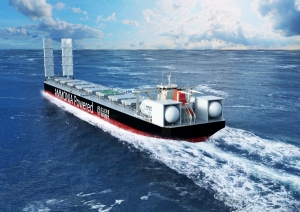


(Posted on 27/01/23)
ClassNK has issued an Approval in Principle (AiP) for a large ammonia fuelled 210,000 DWT bulk carrier jointly developed by Mitsui O.S.K. Lines, Ltd. (MOL) and MITSUI & CO., LTD (MITSUI).
Ammonia is expected to be used as a ship fuel for decarbonization since it does not emit CO2 when combusted. Meanwhile, adequate safety measures are imperative as it has been pointed out that ammonia is toxic to humans and corrosive to materials. ClassNK has been involved in projects aiming for zero-emission ships using ammonia fuel in terms of safety assessment, and has issued its "Guidelines for Ships Using Alternative Fuels” as a necessary standard to minimize the risks related to ammonia-fuelled ships for the ships, crews, and environment by stipulating requirements for installation, controls, and safety devices.
MOL and MITSUI have jointly determined the size and specifications for the vessel, and its design has been entrusted to Mitsubishi Shipbuilding Co., Ltd. ClassNK carried out the review of this jointly developed design in line with Part C of its guidelines and issued the AiP on verifying conformity to the prescribed requirements. In addition, risk assessment (HAZID) will be conducted to confirm that no unacceptable risks exist at the basic design stage and to identify items to be considered in the detailed design.
ClassNK will continue to support those companies as the certification body and will strive to provide appropriate standards for ammonia-fuelled ships through the expertise gained from the collaboration.
Approval in Principle (AiP): At the initial stage of designing or before the specific target ship to be implemented is decided, the design is examined based on the existing regulations such as international conventions and ship classification rules, and an Approval in Principle (AiP) is issued as proof of conformity with requirements. It also prevents rework of regulatory aspects in the post-process, shortens the examination time at the time of class registration, and can be used as a technical basis for external appeal of the design status.
Columbia Group anticipates a period of strong expansion as an increasing number of international shipowners... Read more
Norse?Ship Management has expanded its use of Smart Ship Hub’s high frequency sensor data and... Read more
As the maritime industry gears up to welcome the IMO’s STCW bullying and harassment training amendments... Read more
NORDEN has acquired the cargo activities of Taylor Maritime in Southern Africa (previously operated... Read more
Philippos Ioulianou, Managing Director of EmissionLink, has warned the IMO’s decision to delay... Read more
VIKAND has highlighted the need for cultural change in the maritime sector as reports of bullying, harassment... Read more
The maritime industry is experiencing a period of significant transformation, driven by rapidly evolving... Read more
NorthStandard has advised Members of a 5% increase in P&I premiums for the marine insurance year... Read more
Anemoi Marine Technologies, the UK-based leading designer of Rotor Sails for wind-assisted ship propulsion... Read more
Helm Operations has announced that nine electronic record books within Helm CONNECT Logbook have been... Read more